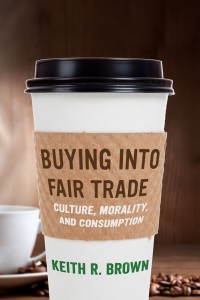Alumnus examines fair trade and ethical consumption
“Consumption, markets, and morality—these issues have always interested me,” says Keith Brown, a Class of 1999 graduate who is now a sociology professor at St. Joseph’s University. He recently spoke to a campus audience about his research interests and his new book, “Buying into Fair Trade: Culture, Morality, and Consumption.”

Keith Brown ’99

Ever since he was a child, Keith Brown ’99 remembers seeing the balance between morality and economics.
“I’ve had a series of meaningful moments where culture shaped economic interactions,” Brown told the audience that gathered on campus earlier this semester to hear his lecture, “Just One Normal Coffee: Crafting a Moral Reputation Through Fair Trade.
During Brown’s childhood years, he said, his mother worked for Bell Atlantic and his father sold products for a fire safety company over the phone. In both atmospheres, Brown was able to see heads and tails. Though his parents seemed upbeat and optimistic while conducting their business, their demeanor changed upon hanging up the phone.
Brown said those experiences were still in his mind when he arrived at TCNJ, in 1995, to study sociology and economics.
“I think consumption, markets, and morality—these issues have always interested me,” Brown said. “I became a sociology major, in part, because I was interested in how culture influences markets, how we make economic decisions, and how that is influenced by our personal beliefs and moral code.”
Brown continued to see these values displayed in the workplace, and that’s what led him to quit his job as a financial planner after one day. He said the company wanted him to have a certain haircut and wear a certain suit; he wasn’t comfortable with such an arrangement.
 Since handing in his business suit, Brown has focused his curiosity on research. Now an assistant professor of sociology at Saint Joseph’s University in Philadelphia, he recently published Buying into Fair Trade: Culture, Morality and Consumption. The book “turns the spotlight onto this growing trend, exploring how fair-trade shoppers think about their own altruism within an increasingly global economy,” according to the publisher’s description.
Since handing in his business suit, Brown has focused his curiosity on research. Now an assistant professor of sociology at Saint Joseph’s University in Philadelphia, he recently published Buying into Fair Trade: Culture, Morality and Consumption. The book “turns the spotlight onto this growing trend, exploring how fair-trade shoppers think about their own altruism within an increasingly global economy,” according to the publisher’s description.
“Fair-trade focuses on how you should buy [a certain] product because it’s more socially responsible,” Brown said. “I was interested to see how morality compares with things like price, taste, aesthetics, and things like that.”
To obtain the data and information he needed about fair-trade coffee and handicrafts, Brown conducted over 100 interviews with fair-trade consumers, national leaders of the movement, coffee farmers, and artisans. He also took trips to Nicaragua to see the fair-trade coffee farms first-hand.
“I think every day we make decisions as consumers that put our moral or ethical code in conflict with our finances, but to see store owners and managers, who own fair-trade coffee shops or handiwork shops, make decisions to try and put their ideals into practice was inspiring,” Brown admitted.
Going into the process with almost no prior knowledge of the two areas of study, Brown was in awe of some of the realities he came to learn about. Although the shop owners’ main concerns were to help those in need, Brown found that they were forced to focus on other areas to sell their products.
“What surprised me is that when people talk about fair trade, they rarely talk [about] the moral imperative of buying responsibly. They don’t say, ‘You should buy this to help save these families,’” Brown explained. “They say, ‘You should buy this because it’s priced competitively or it taste good or it looks nice.’ Very rarely do they promote moral issues and explain why people should buy a product.”
While working on the book Brown came to know Joe Cesa, who owned a fair-trade shop in Philadelphia and helped connect Brown with the fair-trade community. It was through Joe’s story that Brown saw values put into practice, showcasing that money wasn’t everything.
“Joe was losing his home, lost all his retirement [funds], took out all the equity in his home, and basically went bankrupt,” Brown said. “Yet while he was doing that, he was funneling this money toward issues that he cared about. Maybe it wasn’t the smartest decision on his part, but it was still inspiring.”
While Brown admits there are many sides to the story told in his book, he says it’s a story that is just as two-sided as the one he saw growing up.
“On one level it’s an optimistic story about people doing whatever it takes to support the causes that they believe in,” Brown said. “On the other hand, it’s a critical or pessimistic story in the sense that a lot of these movements for social change within markets… at the end of the day these retailers need to make a profit. They’re a business and they have to abide by the rules of the market, and that often means promoting things that they don’t care much about.”
Posted on April 11, 2013

